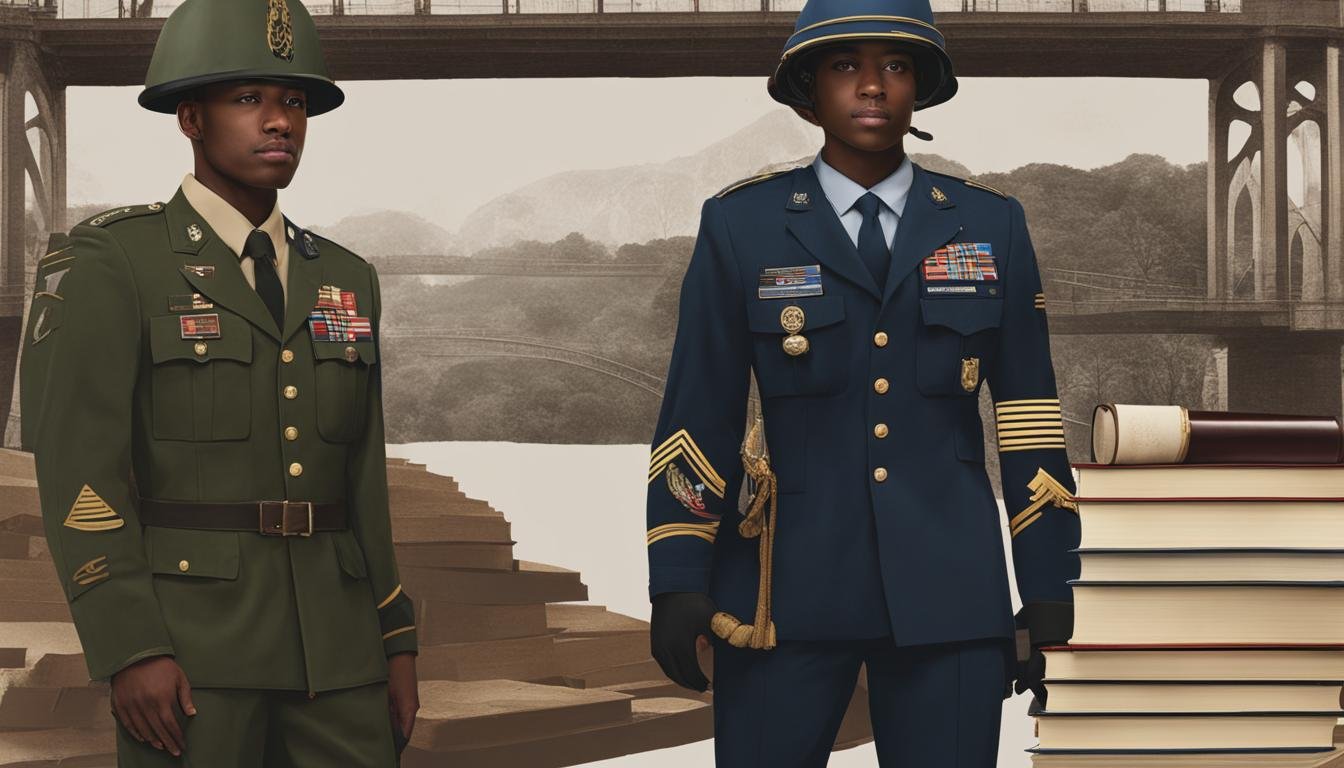Did you know that your military service can serve as a valuable criterion for earning college credit? Whether you’re a current or former service member, converting your military experience into college credit can open up a world of educational opportunities. In this article, we’ll explore how military transfer credits work, the process of converting military experience into college credit, and the benefits of leveraging your military service for educational pursuits.
Key Takeaways:
- Military service can be used as a criterion for earning college credit.
- There are programs like the Post-9/11 GI Bill and the Montgomery GI Bill that provide financial support for education.
- ACE Learning Evaluations offers credit recommendations for military training and occupations.
- The college admissions process for veterans may require applying as a freshman or transfer student.
- It’s important to understand the specific credit policies of the colleges you’re interested in.
ACE Learning Evaluations: Converting Military Training into College Credits
Military service offers valuable training and experience that can be converted into college credits, thanks to ACE (American Council on Education) Learning Evaluations. ACE evaluates military training and occupations to provide credit recommendations that can be applied towards a degree program. Understanding how ACE credit recommendations work and the process of applying them can help service members make the most of their military experience when pursuing higher education.
ACE credit recommendations are based on a thorough review of the learning experience by subject matter experts. These credit recommendations are valid for different durations, with military recommendations typically valid for 10 years. It’s important to note that ACE evaluations may also include workplace competencies, which can be valuable for documenting learning for employers or personal use.
Applying ACE credit recommendations to a degree program depends on the policies of the college or university. Each institution has its own transfer policies and sets its own rules for granting credit. It’s recommended to contact the admissions office of the desired institution to determine credit availability and how to apply ACE recommendations towards a specific degree program. This ensures that service members can maximize their transfer credits and minimize the amount of time and money required to complete their degree.
Many colleges and universities accept ACE credit recommendations, recognizing the value of military training and the skills acquired during service. However, it’s important to remember that acceptance of ACE recommendations varies across institutions. It’s crucial to research and identify colleges that align with individual educational goals and offer the most credit for military training and occupations.
By leveraging ACE Learning Evaluations and understanding the credit application process, service members can turn their military training into college credits, accelerating their path to obtaining a degree. The table below provides an overview of the duration of ACE credit recommendations and some examples of competencies that may be included.
| Duration of ACE Credit Recommendations | Examples of Competencies |
|---|---|
| 10 years | Leadership, team management, critical thinking |
| 3 years | Technical skills, IT certifications, occupational training |
Remember, ACE credit recommendations provide service members with the opportunity to translate their military training into tangible college credits, helping them to further their education and expand their career prospects.
College Admissions Process for Veterans: What You Need to Know

The college admissions process for veterans involves understanding the credit policies for military training and previous college courses. Some colleges award college credits for military training, while others may not. Veterans should contact the admission counselor at the colleges they are interested in to find out the specific credit policies.
The application process depends on the college, with some colleges requiring veterans to apply as transfer students if they have taken any college classes since graduating from high school. Others may allow veterans to apply as freshmen or transfer students based on the number of college classes taken.
Veterans must meet the same admission requirements as regular freshmen or transfer students, which may include having earned a certain amount of college credit, maintaining a specific GPA, and taking certain general education courses. Veterans should provide the required information for the application, including military transcripts and letters of recommendation if necessary.
Some colleges offer fee waivers for veterans, and veterans can seek application assistance from admission counselors or staff members who deal with veteran affairs.
Tips for a Smooth Admissions Process:
- Contact the admission counselor to understand credit policies for military training
- Apply as a transfer student or freshman based on your college credits
- Meet admission requirements, including GPA and general education courses
- Provide required information, such as military transcripts and letters of recommendation
- Explore fee waiver options for veterans
- Seek application assistance from staff members familiar with veteran affairs
“Understanding the credit policies and requirements of each college is crucial in navigating the admissions process as a veteran. Don’t hesitate to reach out to admission counselors for guidance and support.”
Table: College Admissions Checklist for Veterans
| Step | Description |
|---|---|
| 1 | Contact Admission Counselor |
| 2 | Understand Credit Policies |
| 3 | Determine Freshman or Transfer Status |
| 4 | Meet Admission Requirements |
| 5 | Provide Required Information |
| 6 | Explore Fee Waiver Options |
| 7 | Seek Application Assistance |
How Does Military Service Benefit College Credit and Accelerated Degree Programs?
Military service and education pathways can lead to significant benefits for veterans seeking college credit and accelerated degree programs. Many colleges and universities offer credit for military training and experience, allowing service members to expedite their degree completion and transition smoothly into civilian life.
Conclusion: Leveraging Military Service for College Credit and Educational Opportunities
Military service can be a valuable criterion for college credit, offering service members the opportunity to use their military experience to further their education. Programs such as the Post-9/11 GI Bill and the Montgomery GI Bill provide financial support for education, making it easier for veterans to pursue their academic goals.
ACE Learning Evaluations also play a crucial role in converting military training and occupations into college credits. Through credit recommendations, service members can apply their expertise and competencies to their degree programs, maximizing the value of their military experience.
Understanding the college admission process is essential for veterans looking to apply their military service for college credit. By familiarizing themselves with the credit policies of different institutions, veterans can better navigate the application process and optimize their chances of receiving credit for their military training.
Overall, by leveraging their military experience and taking advantage of available resources and support, veterans can open up new educational opportunities and enhance their career prospects. Applying military service for college credit is not only a pathway to personal growth but also a way to recognize and honor the valuable skills and experiences gained during military service.



